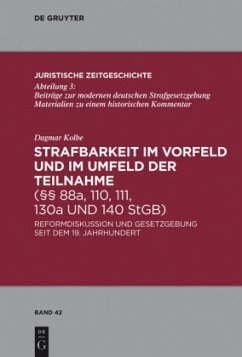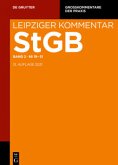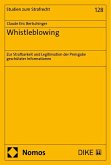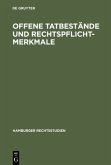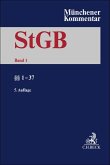In the first chapter of this work, the central issue and the method of presentation are explained. The second chapter describes the legislation of the German particular law (Partikularrecht). The third chapter begins with the development of the Reich Criminal Law Code and is followed by presentations of the reform attempts up to the start of the criminal law reform focused on the "revolution bill"; the drafts from 1909 to 1930, the political periods of the Weimar Republic and of National Socialism, and post-1945 legislation are also addressed.
Die Arbeit befasst sich mit den Gesetzgebungsvorhaben im Zusammenhang mit den im Titel genannten Tatbeständen und ist in drei Teile und zehn Kapitel unterteilt. Im ersten Teil wird im ersten Kapitel die Problemstellung und die Methode der Darstellung erläutert und im zweiten Kapitel die Gesetzgebung im Deutschen Partikularrecht, wobei der Schwerpunkt auf dem Preußischen StGB von 1851 und der Preßverordnung von 1849 liegt. Der dritte Teil beginnt mit der Entstehung des Reichsstrafgesetzbuchs, in den folgenden Kapiteln werden die Reformversuche bis zum Beginn der Strafrechtsreform mit dem Schwerpunkt "Umsturzvorlage", die Entwürfe von 1909 bis 1930, sodann die politischen Perioden der Weimarer Republik und des Nationalsozialismus und daran anschließend die Gesetzgebung nach 1945 und dem Erlaß des § 140 StGB der Kampf gegen den Terrorismus mit den neuen §§ 88a und 130a dargestellt. Jedes Kapitel beginnt mit einer kurzen Einführung und endet mit einem Resumé. Im dritten Teil werden die Untersuchungsergebnisse zusammengefaßt und einer kritischen Würdigung unterzogen. Im Anhang finden sich die Texte der untersuchten Entwürfe und Gesetze und ein Quellen- und Literaturverzeichnis.
Die Arbeit befasst sich mit den Gesetzgebungsvorhaben im Zusammenhang mit den im Titel genannten Tatbeständen und ist in drei Teile und zehn Kapitel unterteilt. Im ersten Teil wird im ersten Kapitel die Problemstellung und die Methode der Darstellung erläutert und im zweiten Kapitel die Gesetzgebung im Deutschen Partikularrecht, wobei der Schwerpunkt auf dem Preußischen StGB von 1851 und der Preßverordnung von 1849 liegt. Der dritte Teil beginnt mit der Entstehung des Reichsstrafgesetzbuchs, in den folgenden Kapiteln werden die Reformversuche bis zum Beginn der Strafrechtsreform mit dem Schwerpunkt "Umsturzvorlage", die Entwürfe von 1909 bis 1930, sodann die politischen Perioden der Weimarer Republik und des Nationalsozialismus und daran anschließend die Gesetzgebung nach 1945 und dem Erlaß des § 140 StGB der Kampf gegen den Terrorismus mit den neuen §§ 88a und 130a dargestellt. Jedes Kapitel beginnt mit einer kurzen Einführung und endet mit einem Resumé. Im dritten Teil werden die Untersuchungsergebnisse zusammengefaßt und einer kritischen Würdigung unterzogen. Im Anhang finden sich die Texte der untersuchten Entwürfe und Gesetze und ein Quellen- und Literaturverzeichnis.

